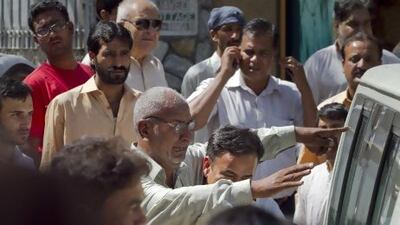KARACHI // Gunmen killed the Pakistani prosecutor investigating the assassination of former prime minister Benazir Bhutto as well as the 2008 Mumbai attacks and other high-profile terrorism cases.
Chaudhry Zulfikar Ali was fatally shot yesterday morning as he drove from his home to an antiterrorism court in nearby Rawalpindi for a hearing in the case against the former military ruler Pervez Musharraf, who faces charges of failing to provide proper security to Bhutto before she was killed in a suicide attack in 2007.
His killing came on a day of bloodshed in Pakistan where campaigning for elections on May 11 has been accompanied by unprecedented violence. Sadiq Zaman Khattak yesterday became the first national assembly candidate to be killed when he was shot along with his three-year-old son in Karachi. He was the latest victim of a Tehrik-e-Taliban Pakistan (TTP) campaign of murder against parties it considers secular.
Ali, the prosecutor, was shot at least 13 times by attackers in a taxi and on a motorcycle before losing control of his car and hitting and killing a nearby woman, a police official said. Ali's guard, who was lightly injured in the shooting, returned fire and injured at least one of the attackers, though they all managed to flee.
Police refused to speculate on a possible motive, and there were no immediate claims of responsibility, but Ali's role in prosecuting some of Pakistan's most high-profile and politically sensitive cases undoubtedly led to his killing, observers said.
"In Pakistan people who are dealing with contentious issues are always in danger," said Hasan Askari Rizvi, a security analyst based in Lahore. "It could have been anyone who would be hurt by these cases."
Mr Musharraf, who returned to Pakistan in March to run in next week's elections, was placed under house arrest for a number of charges stemming from his time as military ruler, including the death of Bhutto. He has denied any involvement in her killing, and maintains that as president he had no role deciding the details of her security arrangements.
Prosecutors issued an arrest warrant for him in February 2011 after a UN inquiry found that his government did not provide adequate security. Last week, Ali said that Mr Musharraf was charged with aiding and abetting the killing and that the evidence against him was "solid".
Ali was reported to have pressed for expedited proceedings against members of the TTP charged with Bhutto's murder.
He recently told reporters that he had received death threats in connection with the case but would not elaborate on the source of the threats.
Ali was also to appear in another potentially explosive case this week involving members of the Pakistan-based Lashkar-e-Taiba (LeT) militant group, which Indian authorities accuse of carrying out the siege of Mumbai in 2008 that left 166 people dead.
The group is thought to be linked to elements of Pakistan's intelligence agencies, who are alleged to have helped create it in the 1990s as a tool to pressure India in the country's dispute over the territory of Kashmir.
Ali was reportedly close to submitting final evidence against seven LeT members in the Mumbai attacks, including its operational leader Zaki ur Rehman Lakhvi. Pakistan's spy agency, the Inter-Services Intelligence Directorate, says it has ended all relations with the LeT. Its leader, Hafiz Saeed, who had a US$10 million (Dh36.7m) bounty placed on his head by the United States last year, lives openly in Lahore.
Bhutto's killing in 2007 occurred just before the country's first elections after nearly a decade of army rule. On May 11, Pakistanis are set to elect a consecutive democratic government for the first time in the country's history.
But the month of political campaigning leading up to the general election has seen the TTP attack parties it considers secular, including all three coalition partners in the outgoing government - the Awami National Party (ANP), the Pakistan Peoples Party (PPP), and the Muttahida Quami Movement (MQM).
At least 75 people have been killed in the Taliban attacks since April 11, Dawn newspaper reported.
The ANP, a Pashtun nationalist party, has endured the bulk of attacks, both in Karachi and the north-western Khyber-Pakhtunkhwa province. Khattak, the national assembly candidate who was shot yesterday, was an ANP member. The election for the seat he was contesting will be delayed.
"He was returning from a mosque after saying his Friday prayers with his three-year-old son when gunmen on a motorbike opened fire. Both were killed," police spokesman Imran Shaukat told the AFP news agency.
A TTP spokesman, who is quoted frequently in the Pakistani media, told Dawn that his organisation carried out the murder as part of its campaign against secular parties.
Khattak's is now the third constituency in the country where elections will be delayed because a candidate was murdered. The other two were candidates for provincial assembly seats.
Residents of Karachi, Pakistan's largest city and economic heart, have been on edge since last week, when three separate bomb attacks targeting the MQM and PPP killed three people and wounded nearly 50 others.
On Thursday night, a bomb wounded eight at an election office of the MQM, Karachi's largest and most powerful party.

